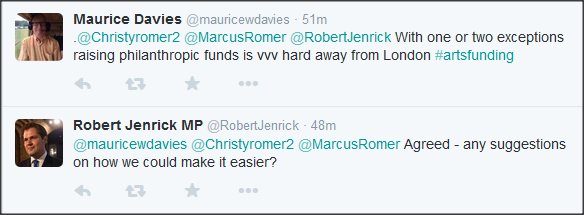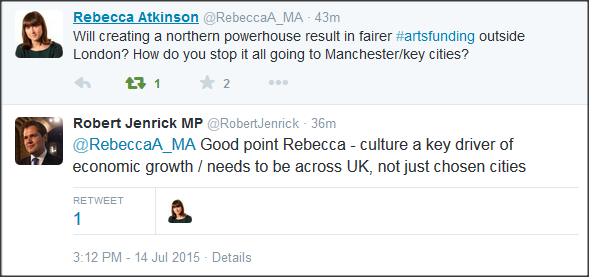Arts sector misses the chance for digital debate with MPs
Arts professionals have proved reluctant to participate in the parliamentary process via social media, with fewer than 15 individuals actively discussing #artsfunding over two days of digital debate.

The Digital Outreach team at Parliament has had only limited success at encouraging members of the public and the arts sector to take part in a Twitter debate on ‘Regional Funding for the Arts’, ahead of a live debate of the same name in Westminster Hall the following day. The digital debate, led earlier this week by Robert Jenrick MP, was prompted by recommendations from the Speaker’s Commission on Digital Democracy that social media should be used as a tool to “inform debates held in Westminster Hall”, “provide a useful resource to MPs” and give the public “the opportunity to have their say in House of Commons debates”.
But in the course of the two-hour Twitter debate, only 10 Twitter accounts actively asked questions and provided responses. Of these, two were already associated with the organisers of the debate and only four tweeted more than once. Engagement during the live debate was stronger, in part buoyed by the tenacious work of @MarDixon in ‘live-tweeting’ it, but still only 8 accounts tweeted more than once.
This lack of engagement comes despite a receptive MP leading the debate; repeated calls for Twitter users to engage with the debate; and provocative statements being made both online and via MPs in the live debate. Jenrick joined publications such as ArtsPro in asking for participation:
He proved willing to engage with pressing questions about funding, such as the difficulties of relying on philanthropy:

And of the risk of assuming that placing funding in a city other than London would immediately balance distribution:

During the Westminster Hall debate itself, Jenrick spoke about the potential to charge non-EU nationals for visits to museums, thereby permitting more funding to go to less well-established museums; about the disparities in arts spending per head in London, compared to the regions; and delivered the line that efforts by the Arts Council to address the problem of a lack of balance are “comparatively modest” and “do not go nearly far enough and are not happening fast enough”.
These sentiments were strengthened by interventions from Susan Elan Jones MP, whose barbed jabs against Government cuts and apparent favouritism might have been expected to provoke a Twitter response. One problem, she said, “is that the Chancellor sometimes likes to give with one hand while taking far more with the other. He likes to give money for cherry-picked projects while cutting local authority and Arts Council funding.” In addition, she asked why cuts to local government have fallen so disproportionately on the most deprived in our country, and urged “this Minister and the Government of which he is a part to live up to the rhetoric and do more to provide regional support for the arts.”
Jenrick echoed the comments of Ed Vaizey, Minister for Culture and the Digital Economy, who described one of the “great advantages” of having a debate on Twitter being that it was easy to catch up with the content at a later date. Despite the low level of response by the arts sector, his concluding comments in the Westminster debate praised the public’s digital involvement and delivered the ultimate message to people who work in the arts, that “Parliament is interested in what they do and what they care about.” But the fact remains: few in the arts sector took the chance to participate.
Join the Discussion
You must be logged in to post a comment.